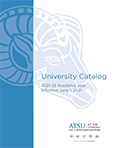Certificate in Health Administration for Community Health Center Leaders
A.T. Still University’s College of Graduate Health Studies (ATSU-CGHS) offers an online graduate certificate in Health Administration for Community Health Center Leaders designed to strengthen the skills of health services professionals who aspire to lead in underserved communities and community health centers (CHCs).
Unique CHC-focused learning activities have been infused in a curated selection of courses. These assessments provide applied learning opportunities through case studies featuring real-world challenges faced by CHC's, projects focusing on enhancing healthcare delivery to underserved populations, and structured discussions highlighting interprofessional healthcare.
Partnership with NACHC
-
Since 1965 (and more prominently from the year 2000), community health centers have provided primary medical, dental, behavioral healthcare, and wrap-around support services to vulnerable patients in the most underserved regions of the U.S.

Graduates of the health administration leadership certificate will be prepared to lead at all levels of any of the more than 1,400 CHCs for which the National Association of Community Health Centers (NACHC) provides advocacy and support.
ATSU-CGHS is proud to have a longstanding partnership with the National Association of Community Health Centers (NACHC). We offer all NACHC members or employees of NACHC organizations a 20% discount on tuition.
-
Advanced standing opportunities
-
Graduates of the Health Administration for Community Health Center Leaders certificate will earn advanced standing, should they choose to pursue further degrees at ATSU-CGHS.
Bachelor’s prepared applicants can seamlessly transition into the Master of Health Administration program with advanced standing. Those who have earned a master’s degree and wish to continue their education can enter the Doctor of Health Administration program, also with advanced standing. The 12 credits earned from the graduate certificate will fully apply toward various program pathways in both of the health administration degrees.
Alternatively, graduates may opt for a public health pathway, where 6 credits from the graduate certificate will be applied toward the Master of Public Health degree.
-
Program essentials
Certificate curriculum overview
The graduate certificate in Health Administration for Community Health Center Leaders packages health administration curricula to address the specific goals of CHCs in providing high-quality healthcare to underserved communities.
Schedule for 1 course per block:
| BLOCK 1 | CREDITS | PROGRAM PATH | |
| DHAD7000 | Leadership and Practice | 3 | DHA, MHA - Core/All tracks |
| BLOCK 2 | CREDITS | PROGRAM PATH | |
| Course 2 | Select one course from approved course offerings listed below | 3 | |
| BLOCK 3 | CREDITS | PROGRAM PATH | |
| MHAD6550 OR DHAD8200 |
Healthcare Financial Management Healthcare Economics and Financial Management |
3 3 |
MHA - Core/All tracks DHA |
| BLOCK 4 | CREDITS | PROGRAM PATH | |
| Course 4 | Select one course from approved course offerings listed below | 3 |
Schedule for 2 courses per block:
| BLOCK 1 | CREDITS | PROGRAM PATH | |
| DHAD7000 | Leadership and Practice | 3 | DHA, MHA (Core/All tracks) |
| Course 2 | Select one course from approved course offerings listed below | 3 | |
| BLOCK 2 | CREDITS | PROGRAM PATH | |
| MHAD6550 OR DHAD8200 |
Healthcare Financial Management Healthcare Economics and Financial Management |
3 3 |
MHA - Core/All tracks DHA |
| Course 4 | Select one course from approved course offerings listed below | 3 |
Select from these approved course offerings:
| COURSE | CREDITS | PROGRAM PATH | |
| MHAD6050 | Managing Human Resources | 3 | MHA (Traditional) |
| MHAD6350 | Data Analytics and Decision Making | 3 | MHA (Traditional, Digital Health) |
| MHAD6850 | Project Management for Healthcare Administrators | 3 | MHA (Traditional, Quality & Patient Safety) |
| DHAD7500 | Population Health | 3 | DHA, MHA (Core/All tracks) |
| DHAD7600 | Quality Improvement and Performance Evaluation | 3 | DHA, MHA (Core/All tracks) |
| DHAD7800 | Health Policy, Law and Regulation | 3 | DHA |
| DHAD8400 | Healthcare Organization Informatics | 3 | DHA |
| DHAD8600 | Health Organization Governance | 3 | DHA |
| DHAD8800 | Strategic Change Management for Healthcare Organizations | 3 | DHA, MHA (Core/All tracks) |
| PUBH5700 | Grant Writing for Public Health Professionals | 3 | MPH, MHA (PH admin tracks) |
| PUBH5750 | Mobilizing Movements: Public Health Advocacy and Leadership | 3 | MPH, MHA (PH admin tracks) |
| PUBH6600 | Public Health Policy | 3 | MPH, MHA (PH admin tracks) |
| PUBH7550 | Community Health Assessment and Program Development | 3 | MPH, MHA (PH admin tracks) |
| CGHS5450 | Developing the Mind & Spirit of Health Professionals | 3 |
Admissions requirements
Candidates applying for admission must have the following:
-
Application:
- Completed and signed admissions application along with a nonrefundable application fee.
-
Academic:
- An accredited bachelor’s degree from a university recognized by the Council for Higher Education Accreditation. Applicants who received their qualifying degree from a university outside the United States will have to provide a degree equivalency evaluation.*
- An official transcript from the qualifying degree-granting institution. For students using VA benefits transcripts for all institutions attended are required.
- A minimum Cumulative Grade Point Average (CGPA) of 2.5 (on a 4.0 scale) at the qualifying degree institution.
-
Elements of success:
- A current resume
- Completion of an essay
- English proficiency **
- Meet technology requirements***
* Applicants who have graduated from a foreign college or university should submit acceptable evidence of U.S. degree/course equivalency. All course work taken at the foreign institution must be evaluated for American institution equivalence by one of the following services:
P.O. Box 5087 Bowling Green Station
New York, NY 10274-5087
P: (212) 966-6311 | F: (212) 739-6139
info@wes.org
7101 SW 102 Avenue
Miami, FL 33173
P: (305) 273 -1616 | F: (305) 273 -1338
info@jsilny.com
Admissions Officers
One Dupont Circle, NW, Suite 520
Washington, DC 20036-1135
P: (202) 293-9161
** Applicants are required to demonstrate proficiency in English when applying to A.T. Still University’s College of Graduate Studies. Written and spoken proficiency in the English language may be demonstrated by one of the following options:
- Option 1 - English is your first language.
- Option 2 - Graduated from a regionally accredited four year college/university in the United States with a BA/BS or graduate degree.
- Option 3 - You are demonstrating your English proficiency by submitting acceptable scores on the Test of English as a Foreign Language (TOEFL).
Accepted test types for CGHS are: The Computer Based Test (CBT), Internet Based Test (iBT), or the Paper Based Test (PBT) are accepted. The following are the minimum required score based on test type:
- CBT - minimum total score of 213
- iBT - minimum total score of 80
- PBT - minimum total score of 550
The TOEFL is administered by:
TOEFL Educational Testing Services
P.O. Box 6151
Princeton, NJ, 08541-6151
P: (609) 771-7100
A.T. Still University’s institutional code is 0339. Please be sure to include this information when you submit your application packet to the TOEFL Educational Testing Services.
Learning outcomes
- Develop and demonstrate a leadership skill set that encourages transformational and ethical leadership, cultural competence, strategic management, continuous learning, accountability, and collaborative engagement to effectively guide CHC organizations in delivering high-quality, patient-centered care while addressing the unique challenges of underserved populations and fostering a positive, inclusive work environment.
- Analyze the unique challenges and opportunities faced by Community Health Centers in providing comprehensive, affordable healthcare to underserved populations, demonstrating critical thinking and systems-level understanding of the CHC landscape.
- Develop and assess initiatives that address the specific needs of Community Health Centers, such as resource allocation, service expansion, and community engagement, while adhering to federal regulations and maintaining financial sustainability.
- Evaluate and implement evidence-based quality improvement initiatives, with a focus on enhancing patient outcomes and reducing health disparities in underserved communities.
- Analyze and apply a variety of financial management principles and practices, such as grant writing, federal funding mechanisms, and sliding fee scales, to ensure long-term fiscal viability while maintaining the mission of serving vulnerable populations.
Why get a health administration certificate designed for CHC leaders?
Community Health Centers (CHCs), also known as federally qualified health centers (FQHCs), are vital in delivering comprehensive, affordable healthcare to underserved rural and urban communities across the United States. As these centers expand their reach and services, the need for experienced executive leaders to guide operations and strategic growth is becoming increasingly critical.
With continued federal funding and initiatives to improve healthcare access, the CHC network is poised for substantial growth over the coming decade. This expansion will require skilled executives to oversee new facilities and programs effectively.
Additionally, many long-tenured CHC CEOs and executives are approaching retirement age, creating a significant demand for qualified candidates who understand the unique challenges and mission of community health centers. Providing leadership development opportunities for these current and future executives is essential to ensuring the continued success of CHCs.
A.T. Still University’s certificate program is uniquely aligned with these needs, offering targeted education and training for health services professionals to prepare them to lead CHCs successfully.
Program goals
ATSU strives to prepare highly competent professionals through innovative academic programs with a commitment to continue its osteopathic heritage and focus on whole-person healthcare, scholarship, community health, interprofessional education, diversity, and underserved populations.
This graduate-level certificate program supports ATSU’s mission as well as the goals of CHC leaders by preparing mid-career health professionals to become innovative leaders and problem solvers within the healthcare industry.
Required courses
DHAD7000 Leadership and Practice
Credits: 3
Theoretical perspectives will allow students to discover the importance of incorporating leadership into healthcare practice. Each student will be able to link these theories to developing personal leadership competency. Students will also learn the features and benefits of involvement with a professional health care organization such as the American College of Healthcare Executives (ACHE).
You will select one of the following finance course offerings:
MHAD6550 Healthcare Financial Management
Credits: 3
This course introduces the essential and practical elements of healthcare financial management to health administration students who may not be financial managers. It places an emphasis on key financial management concepts and their applications that are critical to making business decisions in both non-profit and for-profit healthcare organizations. It integrates finance, economics, and financial and managerial accounting principles. It provides real world examples to guide students through topics in financial statement analysis, value-based purchasing, revenue cycle management, financial planning and analysis, cash budgeting and working capital management, capital budgeting and long-term financing, and organizational financial performance analysis. This course includes a field-work assignment that can be completed in-person or virtually.
DHAD8200 Healthcare Economics and Financial Management
Credits: 3
Students will use key financial and economic principles to examine executive level decisions relative to capitalization, credit ratings, debt capacity, alternate funding sources, business plan development, and overall organizational finance strategy. The concepts will be considered from both non-profit and for-profit healthcare organizational perspectives.
Additional course offerings
You will select two additional courses from the following approved courses.
MHAD6050 Managing Human Resources
Credits: 3
The focus of this course is workforce planning, recruitment, hiring, supervision, motivation, training, evaluation and overall leadership of staff members in healthcare organizations. Emphasis is placed on building strategies to manage both individual employees and teams of employees. Students also will study methods for handling difficult or under-performing employees. This course includes a field-work assignment that can be completed in-person or virtually.
MHAD6350 Data Analytics and Decision Making
Credits: 3
In this course, students will learn how to best analyze, categorize, and manage internal and external data of healthcare organizations. Students will work with actual data sets when analyzing diagnostic, procedural, pharmacy, and administrative data. The emphasis of this course is on administrative data analytics. Students will learn value-based purchasing analytics and risk adjustments. They will also learn data analytics that will facilitate better revenue cycle management with an interdisciplinary approach. Students will gain a better understanding of interdepartmental dependencies and the importance of interdepartmental collaboration on organizational success.
MHAD6850 Project Management for Healthcare Administrators
Credits: 3
Project management expertise is an essential skill for healthcare administrators to ensure that projects are conducted with a proven framework and that these initiatives are aligned with organizational strategy. This course introduces tools and techniques designed to facilitate critical project management knowledge areas, such as scope, schedule, cost, quality, resource, communication, risk, procurement, and stakeholder. Emphasis is placed on the skills and abilities of effective project managers. Students will learn the value of delivering a project on time, within schedule, and to the customer’s satisfaction.
DHAD7500 Population Health
Credits: 3
In this executive course students will investigate healthy people and healthy populations. Students will understand historical perspectives and emerging trends of health issues, populations, shared concerns of society and vulnerable groups. This will include public health risks and how they relate to epidemiology, globalization, changing demographics, and other factors that can affect the health and welfare of the overall population. The role of the health care administrator in promoting population health and wellbeing, as well as identification of potential resources for data and optimization of services will be explored.
DHAD7600 Quality Improvement and Performance Evaluation
Credits: 3
In this executive course, concepts and principles of continuous improvement and patient safety using the Baldrige Criteria will be used. Group work and case studies will allow participants to develop evidence based management principles leading to patient centered, quality driven practices that will result in improved patient outcomes and more efficient and effective organizational practices.
DHAD7800 Health Policy, Law and Regulation
Credits: 3
This executive course will cover significant legislation affecting the health care industry, including current topics in health care reform, advocacy, and policy development. Students will learn about significant legal issues and ethical questions affecting health care administrators, as well as the health policy analysis process.
DHAD8400 Healthcare Organization Informatics
Credits: 3
In this executive course, students will investigate the qualities necessary to strategically evaluate, select and implement system wide informatics. Consideration is given to the effects of the rapidly evolving informatics field and resulting organizational adaptation. Decision support systems integrating financial, human resources, continuous quality improvement, and strategy and resource utilization will be introduced and applied.
DHAD8600 Health Organization Governance
Credits: 3
In this executive course students are involved in processes used to identify and recruit governing boards, and the use of effective management and communication skills to establish board accountability and buy-in. Board development, board composition, fiduciary responsibility, leadership roles and the governing role of the board and its infrastructure are examined.
DHAD8800 Strategic Change Management for Health Care Organizations
Credits: 3
In this executive course, students will investigate and integrate change management practices to strategically position the healthcare organization for the future. Students will assess their organization’s current strategic position and apply relevant theoretical models and the necessary change management practices resulting developing organizational adaptability.
PUBH5700 Grant Writing for Public Health Professionals
Credits: 3
The course is an overview of the importance and process of grant writing for public health professionals. Students are exposed to different types of funding organizations/programs and types of grant proposals. Students will build and apply basic grant writing skills through the exploration of potential funding sources for programs/projects, identification of the basic elements of grant proposals, developing and drafting a grant proposal, and critiquing their drafts and those of their peers.
PUBH5750 Mobilizing Movements: Public Health Advocacy and Leadership
Credits: 3
Advocacy in public health is about working for policy change, improving existing policies,
implementing new laws or practices that improve health outcomes. Public health leaders
protect and promote healthy communities through many means and advocacy is one key
element in this process. This course is designed to equip students with the knowledge and
basic skills to become effective advocates and leaders in the field of public health. Through
a combination of core concepts and practical applications, students will explore the
principles of public health advocacy, leadership strategies, and the role of policy in shaping
health outcomes. Students will explore how local, state government function; and how to
apply advocacy and leadership skills at the local and state level. This course will review the
legislative policymaking process and the role of lobbying, and how to effectively
communicate and work with partnerships and coalitions. In addition, Interpretation and use
of evidence are essential for leaders and advocates and students will develop skills to
understand, interpret and apply evidence. This course will also discuss how funding is a
vital part of public health programs. Additionally, the course offers practical experience in
public health advocacy.
PUBH6600 Public Health Policy
Credits: 3
This is a survey course that provides introductory content dealing with how public health and other health organizations relate to policy and politics. It covers the historical context behind current policies and the role of the public health professional in advocacy, policy development, and implementation. Current policies and their impact on the health of communities and populations will also be discussed.
PUBH7550 Community Health Assessment and Program Development
Credits: 3
This course integrates the principles and practices of community-based health assessment
and program planning, including concepts such as identifying community health needs,
engaging stakeholders, identifying data and funding sources, evidence-based interventions,
and program evaluations. The course culminates in the development of a population-based
public health program plan, fostering critical thinking, cultural awareness, and
interprofessional collaboration.
CGHS5450 Developing the Mind & Spirit of Health Professionals
Credits: 3
This course provides an in-depth examination of sociocultural factors contributing to health
disparities. Students will explore cultural, behavioral, and historical constructs influencing
health outcomes and professional interactions. Biases—both implicit and explicit—are
analyzed through interprofessional, interpersonal, and introspective lenses to identify and
mitigate their impact on care delivery. Emphasis is also placed on promoting mental wellbeing among health professionals and developing effective study and self-management
skills to support success in graduate-level scholarship and professional practice.
Tuition
Review tuition and fees for the Health Administration for Community Health Center Leaders Certificate program. Please note tuition and fees are subject to change.
Financial aid
Federal financial aid is not available for certificate and non-degree enrollments. However, students who go on to pursue ATSU’s Doctor of Health Administration or Master of Health Administration degrees may be eligible for federal financial aid.

Robert Clegg, PhD, has nearly 20 years of on-ground and distance learning (online) university-level curriculum development and academic instruction focusing on healthcare management, public health, and nursing. He also possesses over 18 years of progressive healthcare management experience, including program development, organizational leadership, operating and capital budget development, implementation of cost controls, risk management, quality, and regulatory and corporate compliance.
Dr. Clegg began with ATSU as Chair of the Health Administration programs in March 2021. His areas of research primarily consist of patient safety, quality of care, hospital accreditation and compliance, public health and health promotion. Prior to his academic/teaching career, Dr. Clegg spent nearly a decade as the Patient Safety Officer at a large acute care hospital and in various leadership roles in the not-for-profit sector in the State of California. Philanthropically, Dr. Clegg proudly volunteers his time, talent and treasure on the Board of Directors for the American Red Cross and serve on the Alumni and Volunteer Corporation, Inc., for Sigma Phi Epsilon Fraternity at California State University, Fresno (Fresno State).
Academically, Dr. Clegg earned both his Bachelor of Science in Health Science and a Master of Public Health at Fresno State, and a Doctorate in Human Services with an emphasis in Healthcare Administration (graduation with distinction) from Capella University in Minneapolis, MN. Furthermore, he is a Master Certified Health Education Specialist (MCHES) through the National Commission for Health Education Credentialing, Inc.
Lihua Dishman, DBA, MBA, earned a master of business administration in finance, business, and economics from Wayne State University in Detroit, Mich., and a bachelor of science in statistics and economics from Shanghai University of Finance & Economics in Shanghai, China.
She has nearly 27 years teaching experience with traditional and non-traditional graduate and undergraduate degree programs in managerial finance, statistics, research methodology, and more. Ms. Dishman has delivered courses in 100 percent online, residential, and hybrid modalities. In addition, she has nearly two decades of global financial management experience. Her expertise includes global corporate treasury, global capital markets, and more.
Ms. Dishman led the structure and issuance of multi-billion dollar asset-backed securities within a global treasury group. As lead auditor for a multinational corporation, she successfully completed high profile and strategically critical international assignments. She was a consultant of global corporate finance with a Fortune 10 company for nearly five years following more than six years in private investment banking and institutional asset consulting.
As a member of the CFA Institute and the CFA Society of Detroit, her research interests include financial impact of healthcare reform on healthcare providers, healthcare cost effectiveness of promoting health well-being at workplaces, and how to invest donor assets prudently in not-for-profit healthcare systems.
John Fick, EdD, FACHE, is an associate professor at ATSU’s College of Graduate Health Studies. He received his Doctor of Educational Leadership with a focus on higher education administration from Argosy University, Sarasota, Fla., in 2007, and an Master of Science degree with a specialization in community health services from the School of Medicine, Wayne State University (1983). He joined ATSU as an adjunct faculty member in 2007 and in 2009 became a full-time faculty member in the Health Administration program. At ATSU, has served on the curriculum committee and currently serves on the new faculty hiring committee.
Dr. Fick’s research interests include adult learners and online learning. He is board-certified in healthcare management and is a fellow in the American College of Healthcare Executives. He has served as a fellow of ACEHSA (now CAHME) and was recently awarded the 2010 Distinguished Faculty Award by ACHE Regent in Mich., as well as nominated in 2010 for Faculty of the Year by students in the Master of Health Administration program at ATSU.
Marisa Hastie, EdD, MS, ACSM-EP, PN-1, FACSM is the Dean of the College of Graduate Health Studies at AT Still University. Dr. Hastie received her doctor of education from George Fox University (2013), her master of science in exercise and sport science with an emphasis in biomechanics from the University of Oregon (2003), and her bachelor of science in exercise science from Gonzaga University (2001). She is a fellow of the American College of Sports Medicine (ACSM) and is a certified Exercise Physiologist.
Prior to joining ATSU, she was a Professor of Exercise Science and Program Chair for the Exercise Science Program at Lasell University (Newton, MA). Dr. Hastie also served as the Faculty Fellow for the Fuss Center for Research on Intergenerational Education and Aging and received the deWitt Excellence in Educational Leadership Award from Lasell University. Dr. Hastie served as Faculty Chair of the University’s governance system.
Dr. Hastie has served in several leadership roles at the regional and national level of the ACSM, which include her current roles on the Professional Education Committee at the national level and as the President-Elect for the New England chapter. Her research interests have included exploring the connection between lifelong physical activity and long-term health outcomes, the relationship between exercise training and cognition, and the effects of discrimination experiences on health-related coping behaviors.
Dr. Hastie has extensive experience in online program development, teaching, and assessment. She developed an online Master of Science in Nutrition for Human Performance program and has 18 years of experience in both synchronous and asynchronous teaching formats. She became an educator because she strongly believes in the development of the whole student as a crucial responsibility of higher education institutions.

Department Chair, Health Administration and Nursing
LaVerne Manos, DNP, MS, NI-BC, FAMIA is the chair of the Department of Health Administration and Nursing. Dr. Manos is a visionary academic leader with over 14 years of experience managing graduate nursing and health programs, including leadership roles in CCNE-accredited Doctor of Nursing Practice programs and CAHIIM-accredited informatics degrees. She is nationally recognized for advancing accreditation standards, fostering faculty development, and driving student success in both online and hybrid learning environments.
Dr. Manos brings a wealth of expertise in curriculum innovation, accreditation readiness, and interprofessional education. She has successfully led programs through accreditation cycles, developed new curricula including telehealth and simulation learning, and contributed substantially to national professional organizations and advisory boards. Her academic background includes advanced degrees in Nursing Leadership and Health Informatics, board certification in Nursing Informatics, and a fellow designation from the American Medical Informatics Association. She combines this with practical health administration experience, having led quality improvement and EHR implementation projects in healthcare settings. In this leadership role, Dr. Manos oversees strategic growth, curriculum development, accreditation compliance, and faculty mentorship across both the Doctor of Nursing Practice and Health Administration programs.

Program Director, Health Administration
Robert Clegg, PhD, has nearly 20 years of on-ground and distance learning (online) university-level curriculum development and academic instruction focusing on healthcare management, public health, and nursing. He also possesses over 18 years of progressive healthcare management experience, including program development, organizational leadership, operating and capital budget development, implementation of cost controls, risk management, quality, and regulatory and corporate compliance.
Dr. Clegg began with ATSU as Chair of the Health Administration programs in March 2021. His areas of research primarily consist of patient safety, quality of care, hospital accreditation and compliance, public health and health promotion. Prior to his academic/teaching career, Dr. Clegg spent nearly a decade as the Patient Safety Officer at a large acute care hospital and in various leadership roles in the not-for-profit sector in the State of California. Philanthropically, Dr. Clegg proudly volunteers his time, talent and treasure on the Board of Directors for the American Red Cross and serve on the Alumni and Volunteer Corporation, Inc., for Sigma Phi Epsilon Fraternity at California State University, Fresno (Fresno State).
Academically, Dr. Clegg earned both his Bachelor of Science in Health Science and a Master of Public Health at Fresno State, and a Doctorate in Human Services with an emphasis in Healthcare Administration (graduation with distinction) from Capella University in Minneapolis, MN. Furthermore, he is a Master Certified Health Education Specialist (MCHES) through the National Commission for Health Education Credentialing, Inc.
University catalog
Read the University Catalog to learn more about the program and university. Read detailed course descriptions and obtain answers to many of your questions regarding application and tuition.
A.T. Still University of Health Sciences is accredited by the Higher Learning Commission
230 S. LaSalle Street, Suite 7-500,
Chicago, IL 60604
Phone: 800.621.7440 | Fax: 312.263.7462
Email: info@hlcommission.org
Health administration certificate faculty
The faculty and staff at ATSU-CGHS have diverse academic and working backgrounds in management and healthcare fields, and all hold doctoral degrees or are in the final stage of obtaining a doctorate. Their academic areas of interest include healthcare law, the economics of medical care, organizational theory and its effect in the health industry, health policy, the financing of healthcare, effectiveness/cost-benefit analysis in the healthcare industry, health information systems, quantitative methods and management science.
Faculty Forums
Application
-
Review application deadline dates
For additional information contact an Enrollment Counselor:
877.626.5577 or cghsonlineadmissions@atsu.edu
-
Request information
Have a question for ATSU?
Submit an inquiry for more information on your program of interest.
Missouri Campus
800 W. Jefferson Street Kirksville, MO 63501
877.626.5577
cghsonlineadmissions@atsu.edu





